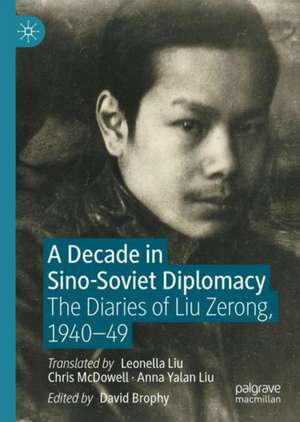A Decade in Sino-Soviet Diplomacy: The Diaries of Liu Zerong, 1940–49
Editat de David Brophy Traducere de Leonella Liu, Chris McDowell, Anna Yalan Liuen Limba Engleză Hardback – 31 dec 2023
Preț: 2130.06 lei
Preț vechi: 2597.64 lei
-18% Nou
Puncte Express: 3195
Preț estimativ în valută:
407.58€ • 444.12$ • 343.45£
407.58€ • 444.12$ • 343.45£
Carte disponibilă
Livrare economică 02-16 aprilie
Preluare comenzi: 021 569.72.76
Specificații
ISBN-13: 9789819940813
ISBN-10: 9819940818
Pagini: 1281
Ilustrații: XII, 1281 p. 10 illus., 6 illus. in color.
Dimensiuni: 148 x 210 mm
Greutate: 1.62 kg
Ediția:2023
Editura: Springer Nature Singapore
Colecția Palgrave Macmillan
Locul publicării:Singapore, Singapore
ISBN-10: 9819940818
Pagini: 1281
Ilustrații: XII, 1281 p. 10 illus., 6 illus. in color.
Dimensiuni: 148 x 210 mm
Greutate: 1.62 kg
Ediția:2023
Editura: Springer Nature Singapore
Colecția Palgrave Macmillan
Locul publicării:Singapore, Singapore
Cuprins
Chapter 1: Introduction.- Part I: Chapter 2: Moscow.- Part II: Chapter 3: Ürümchi.
Notă biografică
David Brophy is a Senior Lecturer in Modern Chinese History, University of Sydney, Camperdown NSW.
Leonella Liu grew up in Beijing before moving to Australia to live and work.
Chris McDowell worked as a project manager in the IT industry.
Textul de pe ultima copertă
The diaries of Nationalist diplomat Liu Zerong shed precious light on a critical period of modern Chinese history and Sino-Soviet relations during the turbulent 1940s in the hotly contested borderlands regions of Central Asia. As one of the few Chinese diplomats of the era who could move within both Chinese and Russian cultural circles with ease, Liu provides fresh new insights into complex diplomatic negotiations that heretofore have only been viewed from the Soviet or Chinese side. Liu's diaries will become required reading for scholars of Xinjiang and Central Asia during the twentieth century."---Justin Jacobs, Associate Professor of History, American University
“The years 1940–49 were a crucial decade for China. In the move from World War II to the civil war and the split across the Taiwan Straits, the role played by the Soviet Union was extremely pivotal. Liu Zerong’s diaries provide us with an insider perspective to understand the evolution of Sino-Soviet relations, especially the origins of the tensions in Xinjiang. This is a heavyweight historical material.”
---Hsiao-ting Lin, Research Fellow and Curator of Modern China/Taiwan, Hoover Institution, Stanford University
This book sheds important new light on Sino-Soviet relations and the politics of the Xinjiang region, publishing for the first time the complete diaries of Liu Zerong, who served as diplomat and foreign ministry envoy from 1940-49. In doing so it provides a chronicle of the downfall of Nationalist Party rule in the crucial frontier region of Xinjiang and its incorporation into the People’s Republic of China. The diaries are introduced with a biographical study of Liu, and a discussion of China’s international position during World War II and the post-war situation in Xinjiang, which at the time was divided between a sphere of GMD control and the Soviet-aligned East Turkistan Republic. Both in the Moscow embassy, and in the Xinjiang provincial administration in Ürümchi, Liu Zerong was Republican China’s most senior Russian-speaking representative, whose task it was to engage on a daily basis with his Soviet counterparts. His extensive diaries therefore offer a unique insight into this tense decade of Sino-Soviet diplomacy, and will be of interest to a wide range of scholars in fields of Chinese and international history.
David Brophy is a Senior Lecturer in Modern Chinese History, University of Sydney, Camperdown NSW.
“The years 1940–49 were a crucial decade for China. In the move from World War II to the civil war and the split across the Taiwan Straits, the role played by the Soviet Union was extremely pivotal. Liu Zerong’s diaries provide us with an insider perspective to understand the evolution of Sino-Soviet relations, especially the origins of the tensions in Xinjiang. This is a heavyweight historical material.”
---Hsiao-ting Lin, Research Fellow and Curator of Modern China/Taiwan, Hoover Institution, Stanford University
This book sheds important new light on Sino-Soviet relations and the politics of the Xinjiang region, publishing for the first time the complete diaries of Liu Zerong, who served as diplomat and foreign ministry envoy from 1940-49. In doing so it provides a chronicle of the downfall of Nationalist Party rule in the crucial frontier region of Xinjiang and its incorporation into the People’s Republic of China. The diaries are introduced with a biographical study of Liu, and a discussion of China’s international position during World War II and the post-war situation in Xinjiang, which at the time was divided between a sphere of GMD control and the Soviet-aligned East Turkistan Republic. Both in the Moscow embassy, and in the Xinjiang provincial administration in Ürümchi, Liu Zerong was Republican China’s most senior Russian-speaking representative, whose task it was to engage on a daily basis with his Soviet counterparts. His extensive diaries therefore offer a unique insight into this tense decade of Sino-Soviet diplomacy, and will be of interest to a wide range of scholars in fields of Chinese and international history.
David Brophy is a Senior Lecturer in Modern Chinese History, University of Sydney, Camperdown NSW.
Leonella Liu grew up in Beijing before moving to Australia to live and work.
Chris McDowell worked as a project manager in the IT industry.
Caracteristici
Sets out the key issues in Sino-Soviet relations and the politics of Xinjiang in the 1940s Illuminates the origin of CCP ethnic policies Offers a new starting point for Xinjiang studies
